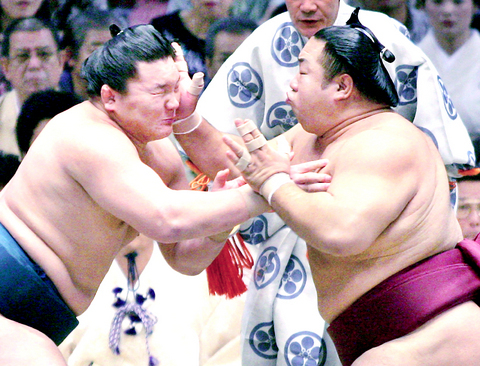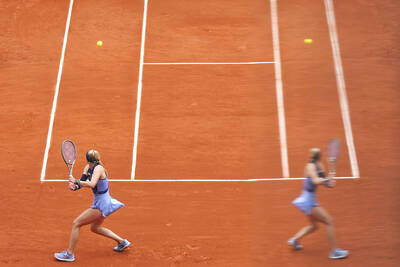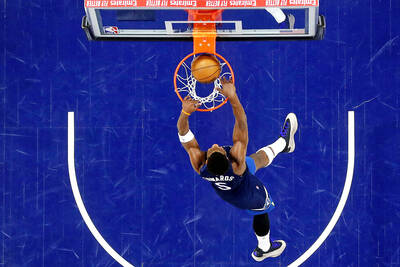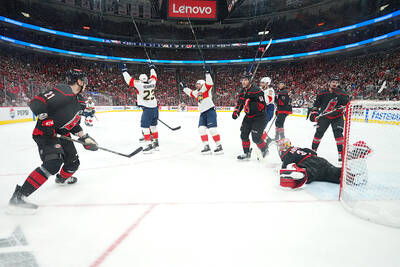Japan's proud national sport, sumo, has more to it than just putting two large, semi-naked people in a ring and have them try to push each other, they say.
"People think it's so easy, but they should try it and see for themselves how difficult it is," Kotooshu, the first European to ever proceed to the second-highest rank of sumo in Japan, explained.
Kotooshu incorporated the techniques particular to sumo in his Western wrestling skills. Within three years and two months, the Bulgarian native climbed the ladder to the second-highest rank of ozeki in Japan.

PHOTO: AFP
But Kotooshu was shocked to see conventional discipline dominating Japan's national sport in the 21st century. He expected to train with state-of-the-art equipment, he said.
"`What in the world is this?' was honestly my first impression," the wrestler said in Japanese after routine training one morning. "You can get arrested for doing that [caning] in other countries."
About 30 large, naked men in their beige loin cloths stood and observed a lower rank member tackling his practice partner head-on during the training.
Before breakfast at around 6am, the members come down from their dormitory rooms to the practice ground with a ring made of rope.
It's a sacred place where they are engulfed with energy. Not even whispers are heard. The only noises are loud panting, wheezing of the wrestlers' lungs and occasional caning on their legs.
Cued by the stable master and trainers mumbling in their rough voices, senior wrestlers would slap or blow water on a junior member being trained.
Kotooshu was no exception. He says he was caned on his thigh three times before he became ozeki. He couldn't protest because of his language ability.
But he believed that endurance makes perfect and built up his strength.
When Japan's national sport was risking a loss in popularity, foreign wrestlers like Kotooshu joined the industry and appeared on TV, saving sumo from retreating into the background.
As the number of non-Japanese sumo began to rise in 2000, the sport has regained its fame and fans. And Kotooshu has contributed to the boost in popularity.
The ozeki, born as Kaloyan Stefanov Mahlyanov, stands tall at 2.03m and slim at 147kg, unlike classic sumo wrestlers whose stomach extends out and thighs sag.
The young Bulgarian wrestler was scouted by a sumo federation in his home country before traveling half way around the world.
Nicknamed "Gentle Giant," Kotooshu likes to sleep in, go out for dinners and to movies with friends on his days off.
But the man who loves sports and chose sumo as his life's vocation wants to spread the fascination of sumo around the world.
Sumo is barely keeping its quota with the entry of foreign nationals into the field, because very few Japanese young people show interest in it.
Currently, Mongolian athletes are in the majority among 12 non-Japanese nationalities.
Although the Sumo Association limits its 54 stables to accepting one foreign national, Kotooshu thinks the game needs more promotion abroad and can appeal to the world as an international sport just like judo.
just one win
Grand champion Asashoryu was only one win away from the championship yesterday, defeating Kaio to stay in sole lead at the Nagoya Grand Sumo tournament.
In the day's final bout at Aichi Prefectural Gymnasium, Mongolia-born Asashoryu quickly got a firm hold on the ozeki's belt to shove him out of the ring and into the stands.
Asashoryu's record improved to 13-0 -- one win away from clenching the championship -- while Kaio fell to 8-5.

Carlos Alcaraz on Monday powered into the French Open second round with a resounding win to start his title defense, while world No. 1 Jannik Sinner and three-time defending women’s champion Iga Swiatek also progressed at Roland Garros. Four-time Grand Slam champion Alcaraz struck 31 winners in a 6-3, 6-4, 6-2 victory over Italian qualifier Giulio Zeppieri and is to face Hungary’s Fabian Marozsan in round two. Alcaraz is now on an eight-match winning streak at the French Open and also took Olympic silver at Roland Garros last year, losing the final to Novak Djokovic. “The first round is never

SSC Napoli coach Antonio Conte has dragged the team back from disaster and restored them to the top of Italian Serie A, but his future at the Scudetto winners is in doubt even after a triumphant season. The fiery 55-year-old has exceeded preseason expectations and bolstered his reputation as a serial winner by guiding Napoli to their fourth Scudetto, and second in three seasons. However, he might well be on his way in the summer after just one season at the helm as his charged relationship with Napoli owner Aurelio De Laurentiis has simmered throughout the campaign. Conte has said

‘HELLA ENERGY’: Minnesota’s 42-point victory set a club record for points in a playoff game, but the team have to keep up their momentum to stay in the series, Edwards said Anthony Edwards on Saturday night scored 30 points and the Minnesota Timberwolves overwhelmed Oklahoma City 143-101 to tighten their NBA playoff series. Edwards added nine rebounds and six assists. while shooting 12-of-17 from the floor and 5-of-8 from three-point range as the hosts Timberwolves pulled a game back to be 2-1 behind in the best-of-seven Western Conference Finals. However, moments after the 42-point win, Minnesota were determined to forget all about it. Such is life in the NBA playoffs. “You’ve got to erase this one,” Edwards said. “This one is over. I know everyone is happy about this one, but we know OKC is

The horn sounded on Wednesday night to signal a third straight trip to the Stanley Cup Final, as the Florida Panthers celebrated merely by hopping over the boards and several heading over to congratulate goaltender Sergei Bobrovsky. It was a subdued celebration seemingly more befitting a regular-season win for the reigning Cup champs. “I remember a few years ago, it felt like such an accomplishment from where we were at one point,” forward Matthew Tkachuk said, adding: “It’s all business and we’ve got a bigger goal in mind.” The Panthers closed out the Carolina Hurricanes in five games, with a 5-3 victory in